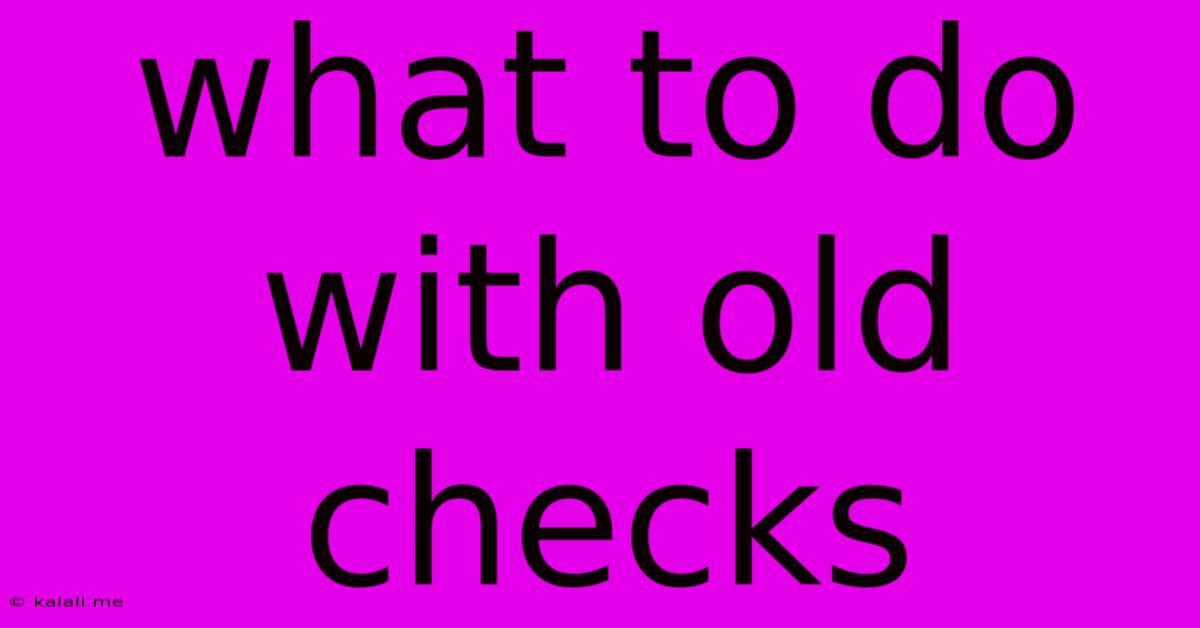What To Do With Old Checks
Kalali
Jun 06, 2025 · 3 min read

Table of Contents
What to Do With Old Checks: A Comprehensive Guide
Meta Description: Confused about what to do with those old checks piling up? This guide covers everything from securely shredding outdated checks to understanding potential legal ramifications of improper disposal. Learn how to protect yourself from fraud and stay organized.
Dealing with old checks might seem like a minor task, but improperly disposing of them can expose you to significant risks, including identity theft and fraudulent activity. This comprehensive guide provides a step-by-step approach to safely and effectively manage your outdated checks, ensuring your financial security and peace of mind.
Understanding the Risks of Improper Disposal
Before diving into the solutions, let's understand why it's crucial to handle old checks responsibly. Simply throwing them in the trash leaves your personal and financial information vulnerable. This information, including your bank account number, routing number, and signature, can be used by criminals for various fraudulent activities like:
- Identity theft: Thieves can use your information to open fraudulent accounts or make unauthorized purchases.
- Check fraud: They can alter or forge your checks to steal money.
- Financial scams: Your details could be used to target you in phishing or other scams.
Methods for Securely Destroying Old Checks
Now that we've established the importance of proper disposal, here are the most effective methods for destroying your old checks:
1. Shredding: The most secure method is using a cross-cut shredder. This type of shredder cuts paper into tiny pieces, making it extremely difficult for anyone to reconstruct your information. Avoid strip-cut shredders as they only cut the paper into strips, leaving your information relatively intact.
2. Burning: If you have a safe and controlled burning area, burning checks is another effective method. Ensure the ashes are completely dispersed afterward.
3. Check Destruction Services: Some banks offer check destruction services for a fee, providing a convenient and secure option, especially for large quantities of checks.
How Long Should You Keep Old Checks?
The length of time you should keep old checks depends on various factors, including your personal accounting practices and potential tax implications. Generally, it's recommended to keep canceled checks for at least one year, and preferably longer, particularly if they relate to large transactions or tax-deductible expenses. Always consult with a tax professional for specific advice regarding your tax records.
Beyond Disposal: Organizing Your Checkbook
Effective checkbook management plays a crucial role in minimizing the accumulation of old checks. Here are some tips for staying organized:
- Maintain a digital record: Scan or photograph your checks and store them digitally in a secure, password-protected location. Cloud storage services can be used, but ensure they are reputable and offer strong security features.
- Regular reconciliation: Regularly reconcile your bank statement with your checkbook to identify any discrepancies promptly.
- Online banking: Transitioning to online banking can significantly reduce the number of physical checks you receive and write.
Conclusion: Protecting Yourself from Financial Fraud
Proper disposal of old checks is not just about tidying up; it's a crucial step in protecting your financial well-being. By utilizing secure destruction methods and implementing responsible checkbook management strategies, you can significantly reduce your risk of identity theft and fraud. Remember to always stay vigilant and report any suspicious activity immediately to your bank and the relevant authorities.
Latest Posts
Latest Posts
-
What Part Of Speech Is About
Jun 07, 2025
-
Sql Search Stored Procedures For Text
Jun 07, 2025
-
Gta How To Get Inside Prison
Jun 07, 2025
-
550 Ssl Tls Required On The Control Channel
Jun 07, 2025
-
Why Does My Cat Come To The Bathroom With Me
Jun 07, 2025
Related Post
Thank you for visiting our website which covers about What To Do With Old Checks . We hope the information provided has been useful to you. Feel free to contact us if you have any questions or need further assistance. See you next time and don't miss to bookmark.